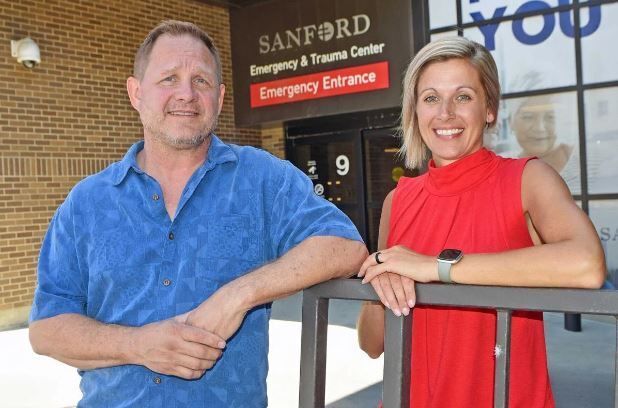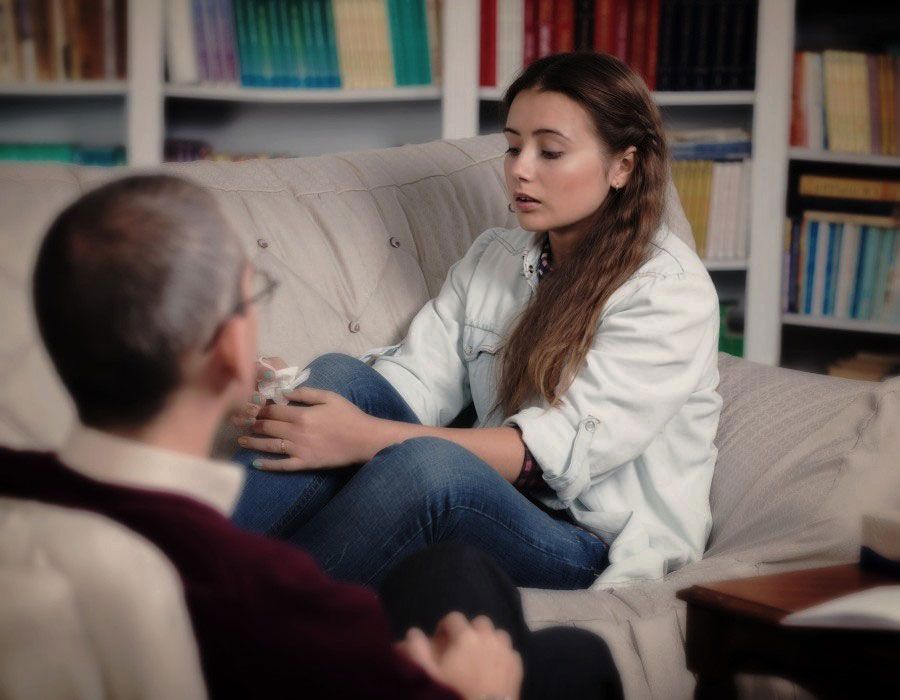
NEWS RELEASE Contact: Kurt Snyder, Executive Director
FOR IMMEDIATE RELEASE 701-222-0386
Aug. 3, 2022
Image: Heartview Foundation Executive Director Kurt Snyder and Chief Operating Officer Jessica Brewster outside Sanford Health's emergency room in downtown Bismarck on Thursday. Heartview is spearheading a program that aims to bridge the gap between emergency services for overdose victims and treatment for opioid addiction. Picture: Tom Stromme
BISMARCK –Heartview Foundation, in partnership with Sanford Health, CHI, Ministry on the Margins, and the Bismarck Police Department, launched a program this week to help bridge overdose victims into treatment. In January, the Bismarck Police Department received a grant of nearly $1 million from the Department of Justice to help combat the opioid overdose epidemic. Since the beginning of the year, Heartview Foundation has been hiring staff for the program and working with hospital partners to train ER physicians and work out project details. On Monday, Aug. 1, the program began at Sanford’s Emergency Room, with plans to expand the program to CHI and other hospitals across the state in the near future.
The grant will place Heartview staff in local emergency rooms to bridge the gap between emergency services and opioid treatment. The Heartview team hired for the program includes six recovery coaches, a nurse practitioner, and a case manager, with plans in the future to hire a nurse and a licensed addiction counselor.
“Typically, if Narcan is given by a police officer or member of the public, the overdose victim is taken to the ER, stabilized, and released,” says Kurt Snyder, Heartview Foundation’s executive director. “This grant has given us the ability to meet individuals at one of the lowest points of their lives and provide peer support and buprenorphine, a medication assisted treatment, for a few days, when they can either enter services at Heartview, another treatment facility, or we can help them transition safely into the community.”
Overdose victims who participate in the program will be assigned a peer support specialist and case manager to assist them in getting into Heartview’s treatment programs and stabilizing their life as soon as possible. Although Heartview currently has a waiting list for residential services, the planned opening of an additional 13 beds in Bismarck in August will help alleviate wait times.
The Bismarck Police Department reports that as of July 26, officers have responded to 83 overdoses, 14 of those resulting in death.
“Law enforcement cannot arrest our way out of the opioid epidemic,” says Bismarck Police Chief Dave Draovitch. “There must be a way to get people help for their addiction at the time they need it. This program allows that to happen.”
“Research tells us that starting the person on medication assisted treatment while in the ER, right after an overdose, decreases death rates by 50%,” says Cathy Palczewski, the Heartview grant project manager. “Connecting an overdose victim to peer support takes the fear and clinical nature away from the unknown and makes them feel at ease and in similar company.”
Overdose victims not ready to commit to treatment will receive initial peer support services from Heartview and then be transitioned to community outreach provided by Ministry on the Margins with the end goal being to eventually get the person into treatment or engaged in the recovery community.
The peer support staff in the ER can directly relate to the struggles of overdose victims. “It is helpful for us to be there because we relate to them,” says Beth Hale, a Heartview peer support specialist.
“We know the struggles, the worries and fears. We can let them know they aren’t alone. Since we’ve been where they are and now we are on the other side of things it can give hope to others who are still struggling.”


